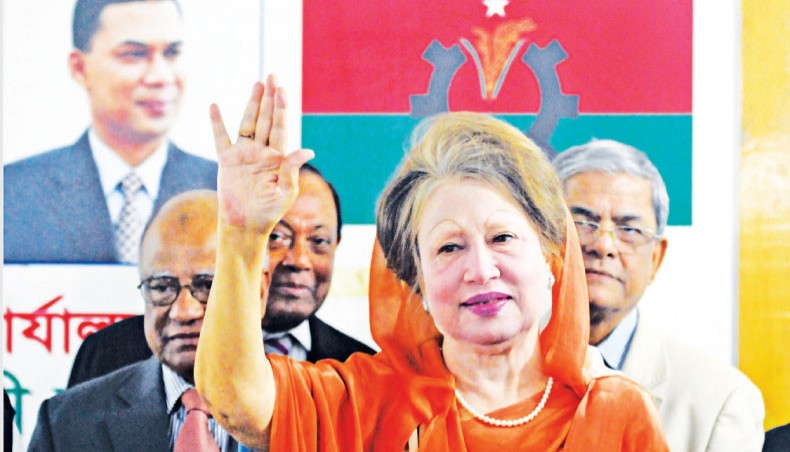Maiden verdict on Khaleda scheduled for today
The Dhaka Special Judge’s Court-5 is scheduled for today to pronounce verdict in Zia Orphanage Trust corruption case against Bangladesh Nationalist Party chairperson Khaleda Zia, her eldest son Tarique Rahman and four others.
As judge Md Akhtaruzzaman on January 25 posted for today the maiden verdict in one of the 36 cases filed so far against Khaleda, the government tightened security across the country arresting several thousand BNP leaders and activists and banning any gathering and procession in Dhaka for today.
Members of paramilitary Border Guard Bangladesh were deployed in BNP strongholds, including Bogra, Narayanganj, Lakhsimipur, Chandpur and Noakhali. Police continued raids while BNP accused the law enforcers of atrocities at houses they raided.
Akhtaruzzaman, who convicted 850 people in BDR munity cases in 2013, set the date for verdict concluding the hearing in the case filed by the Anti-Corruption Commission on July 3, 2008 during military-controlled interim regime.
Khaleda’s trial came to an end within two weeks after prime minister Sheikh Hasina announced in a televised speech on January 12 that parliamentary elections would be held in December.
Prosecutor Mosharraf Hossain Kajol in his closing arguments sought highest punishment for all the accused under Section 409 of the Penal Code, which prescribed life term, or jail for up to 10 years with or without fine, while defence sought Khaleda’s acquittal saying that the prosecution failed to prove the charge ‘falsely brought only to politically harass Khaleda.’
Article 66(2)(d) of the constitution stipulates, ‘A person shall be disqualified for election as, or for being, a member of parliament who has been, on conviction for a criminal offence involving moral turpitude, sentenced to imprisonment for a term of not less than two years, unless a period of five years has elapsed since his release.’
The prosecution said that the trial in the case ended after hearings spreading 236 working days, including 16 days for closing arguments by both the prosecution and defence.
During the trial, 36 prosecution witnesses testified in high-guarded makeshift courtroom set up at Bakshibazar, and cops used to cordon each of the prosecution witnesses.
The prosecution had argued that the then prime minister Khaleda, during her 1991-96 tenure, received a fund of Tk 4.44 crore from United Saudi Commercial Bank on June 9, 1991 for Prime Minister’s Orphan Fund and created Shaheed Ziaur Rahman Orphanage Trust September 5, 1993 and transferred a fund of Tk 2.33crore to it.
Between May 12, 2006 and July 4, 2006, Tarique transferred Tk 3.30 crore, including the interest to an account of then BNP lawmaker and businessman Qazi Saleemul Huq Saleemul Huq in five phage and misappropriated Tk 2.10 crore. Tarique’s cousin Mominur assisted the crime, the prosecution argued.
Saleemul later deposited the fund under Fixed Deposit Receipt with Prime Bank and later withdrew the money in exchange of the FDR and transferred those to his account without being a trustee of the trust, argued the prosecution.
Businessman Sharfuddin Ahmed finally withdrew Tk 2.10 crore. The then prime minister office’s principal secretary Kamal Uddin Siddique did not maintain the fund properly and committed criminal misconduct, said the prosecution.
Khaleda told the court that she was not afraid of 36 cases she was facing and the cases were filed on ‘false and baseless’ allegations.
‘But, the people as well as we are concerned as the environment and scope of delivering justice were destroyed tactfully and heinously,’ she said in her statement during her examination.
The BNP chief alleged that the government prosecuted her only to harass and malign her and by doing this the government was being abased.
She said that the first inquiry officer Nur Ahmed, also a prosecution witness, had not implicated her in the case but the last inquiry officer Harun or Rashid in two weeks implicated her and put some additional information.
Her lawyers also urged that the fund was a personal donation and Khaleda had no link with the trustee board of the trust. She had no executive power as a prime minister when the fund was received.
Defence counsel Abdur Rezzaque Khan argued that the ‘half-hearted and partial’ investigation into the case had been launched during military-controlled interim regime.
The defence lawyers also said that the prosecution witnesses in their testimonies and examinations repeatedly admitted that seized documentary evidences were found tempered, unsigned and rubbed.
In August 2009, Anti-Corruption Commission assistant director Harun-or-Rashid submitted the charge sheet against Khaleda, Tarique, Mominur, Qazi Saleemul, Sharfuddin and Kamal Uddin.
Tarique, Mominur and Kamal Uddin were tried in their absence.
On March 19, 2014, Special Judge’s Court-3 judge Bashudev Roy framed charges against the five without reading out the charges as required by the law.
Amid a debate, Bashudev on September 22, 2014 began trial and the defence counsels expressed no confidence in the court.
In December 2014, the law and justice division’s joint secretary Abu Ahmed Jamadar replaced Bashudev and the proceeding started again.
In May 2017, the High Court accepted a petition of Khaleda to change the court and assigned the trial in the case to the court of Md Akhtaruzzaman.
Khaleda is now facing 36 cases. Four graft cases were filed until Awami League assumed in 2009 while the rest of the cases, including on charge of sedition, political violence and setting vehicles on fire, were filed in the past eight years.
News Courtesy: www.newagebd.net











